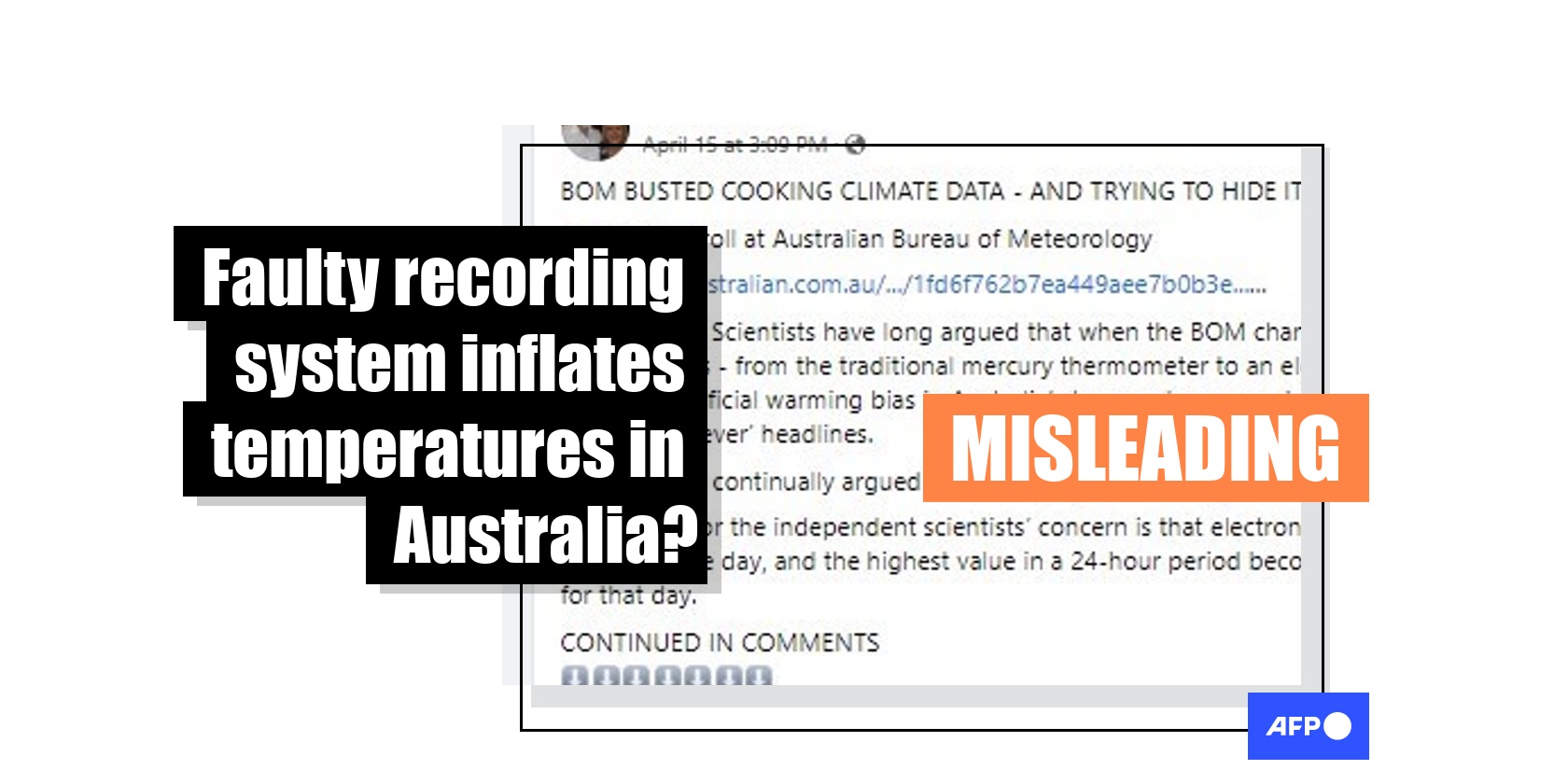
Misleading posts blame Australia's record heat on 'measurement error'
- This article is more than two years old.
- Published on May 12, 2023 at 10:25
- 4 min read
- By Kate TAN, AFP Australia
"BOM BUSTED COOKING CLIMATE DATA -- AND TRYING TO HIDE IT," read a post shared on Facebook on April 15.
"Scientists have long argued that when the BOM changed the equipment to record temperatures -- from the traditional mercury thermometer to an electronic probe -- that this would create an artificial warming bias in Australia's temperature record -- and artificially create new 'hottest day ever' headlines," it adds.
Australia has in recent years experienced a series of extreme weather events -- from flash floods to catastrophic bushfires -- linked to rising global temperatures.

The post shared a link to an article from The Australian newspaper that says an analysis of BOM data by scientist Jennifer Marohasy -- a known climate sceptic -- found discrepancies in temperature readings between electronic probes and mercury thermometers installed at the Brisbane Airport.
Marohasy wrote on her blog on April 15 that BOM's electronic probe "twice recorded 0.7 degrees Celsius (1.26 degrees Fahrenheit) warmer than the mercury for the same weather".
A screenshot she shared in her post -- showing a document obtained through a freedom of information request -- shows a difference of 0.6C (1.08F).
The Institute of Public Affairs, a high-profile conservative Australian think tank where Marohasy is a senior fellow, also tweeted the article to highlight her quote. It reads in part: "Future new record hot days could be a consequence of the probe rather than global warming."
Australian Senator Gerard Rennick shared the article on Facebook and wrote: "The so-called rising temperatures is a result of poor quality assurance around measuring temperature observations, rather than changes in CO2."
Former congressman Craig Kelly also referenced the article in a tweet accusing the BOM of "doctoring temperatures".
Similar claims were shared more than 2,300 times on websites such as The Daily Sceptic -- which has previously shared climate misinformation -- and by social media users in Australia and the UK.
However, Dr Anthony Rea, director of infrastructure at the World Meteorological Organization, the United Nations body on atmospheric science, told AFP on May 8 that BOM's temperature measurements "are in no way an outlier or seen to be inconsistent with global measurements."
'Essentially no difference'
Multiple climate experts told AFP the observed variations in the BOM's temperature data are minor and do not indicate tampering as the posts allege.
Monash University environment professor Neville Nicholls said his analysis of BOM's weather data here showed the difference between the readings in the newer electronic probes and the older mercury thermometers were "very small" (archived link).
"The majority of the differences in the files I checked were either zero or 0.1C (0.18F) either higher or lower, ie essentially no difference,” he said, citing maximum temperature data recorded at 9am at the Brisbane airport.
Two sensors in adjacent thermometer screens producing minor differences are "a fact of meteorological life", Dr Stephen Burt, a visiting fellow at the University of Reading, said on May 6.
"I dismiss the suggestions that the BOM is 'doctoring' the recorded temperatures," he said.
Responding to Marohasy's analysis, BOM chief customer officer Peter Stone told AFP on April 28 it was "not surprising to get a difference on a given day".
But data on average show "no significant systematic differences" between electronic probe and mercury thermometer readings for three decades, he said.
The agency installed the electronic sensors at the Brisbane Airport in 1987 and has used these as the primary instrument since 1996 (archived link).
"There are no significant systematic differences between two measurements on average from 1987 to now," Stone said.
Global warming
University of New South Wales professor Steven Sherwood told AFP on May 9 that temperature records beyond Australia show the planet is warming.
"Many natural indicators confirm global warming including receding glaciers, rising sea level, earlier spring flowering of plants, migration of species, and changes to hydrology, none of which are controlled by the BOM," he said.
Dr Rea from the World Meteorological Organization similarly said: "There are multiple lines of evidence proving that global temperatures are rising, from satellites to ocean buoys to deep sea profilers. All evidence points in the same direction."
The organisation said the global temperature in 2022 was about 1.15C (2.07F) above the levels from 1850-1900 and the last eight years were the warmest on record (archived link).
Global average sea level has risen 21–24 centimetres (eight to nine inches) since 1880, while summer Arctic sea ice extent is shrinking by 12.6 percent per decade as a result of global warming (archived links here and here).
"It is unequivocal that human influence has warmed the atmosphere, ocean and land," said a 2021 report published by the Intergovernmental Panel on Climate Change, which represents scientific consensus on the issue (archived link).
The same report says average global temperatures would reach or exceed 1.5C (2.7F) of warming over the next 20 years.
AFP has previously debunked climate misinformation misrepresenting temperature data.
Copyright © AFP 2017-2026. Any commercial use of this content requires a subscription. Click here to find out more.
Is there content that you would like AFP to fact-check? Get in touch.
Contact us




